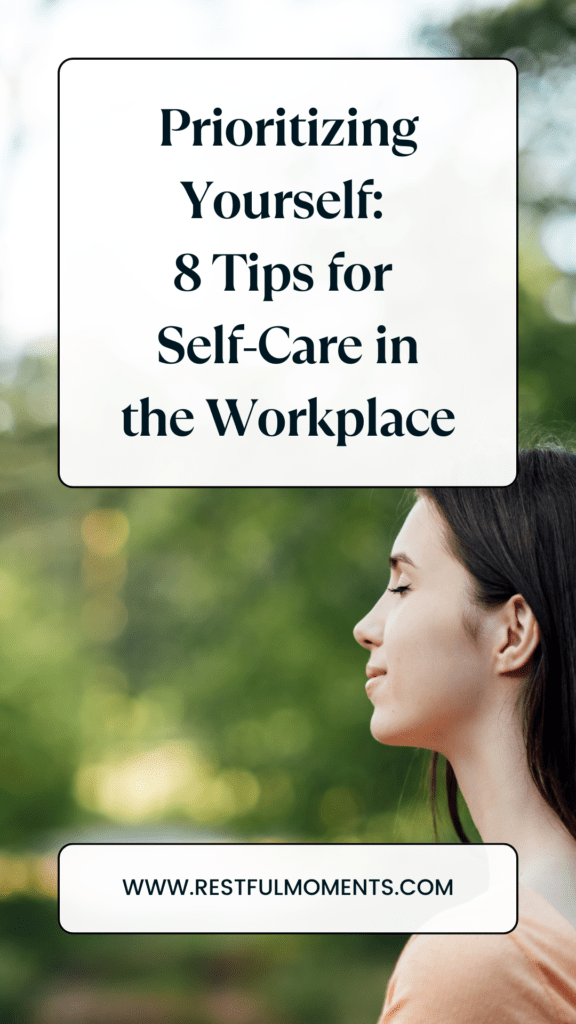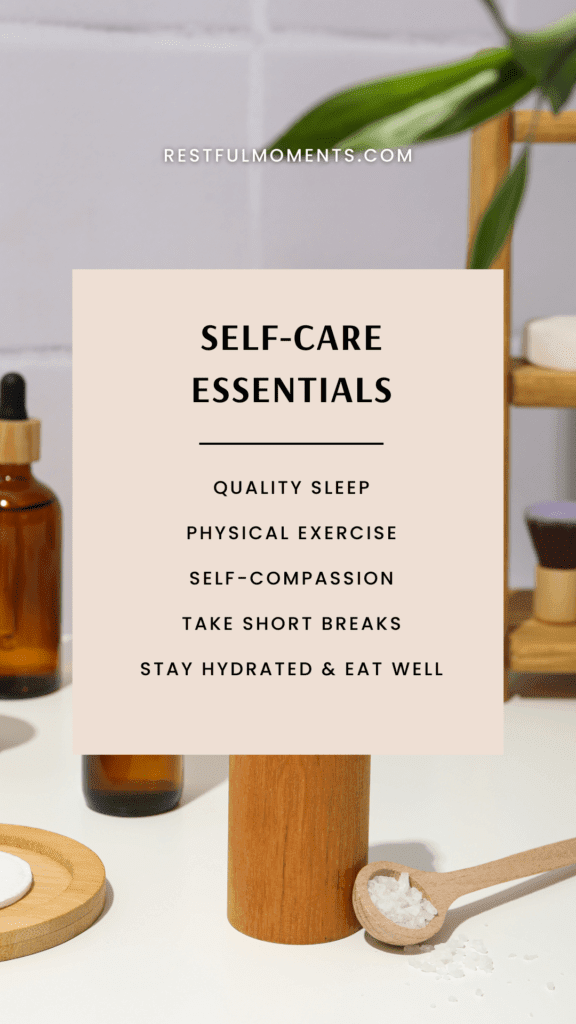Why is it that we often prioritize everything and everyone else above ourselves? What if I told you that taking care of yourself is not a luxury but a necessity, and neglecting it could have consequences beyond imagination?
In this post, we delve deep into the art of self-care, exploring why it’s essential for your overall well-being and how you can integrate it into your life. Whether you’re a busy professional, a parent juggling multiple responsibilities, or simply seeking a more balanced and fulfilling life, this article is for you.
We’ll uncover the transformative power of self-care and provide practical insights on creating a self-care plan that suits your unique needs.
What Is Self-Care?
Self-care is about taking care of your mind, body, and environment. It’s a simple yet powerful concept that ensures you nurture your well-being. This means looking after your mental and emotional health as much as your physical health.
Self-care is all about balance. It’s finding that sweet spot between being productive and allowing yourself to relax. It’s not just about constant work or endless leisure; it’s about creating harmony between these two aspects of life.
In a world that often celebrates busyness, it’s easy to forget the importance of slowing down.
Self-care isn’t selfish; it’s essential. It equips you with the strength and energy to face life’s challenges with a clear mind, a healthy body, and a positive outlook.
Why Self-Care Is Essential
Self-care is not a luxury; it’s a necessity. In a world that often glorifies relentless work and constant striving, taking care of yourself might feel like an afterthought.
However, it’s precisely this care that forms the foundation for a healthy, balanced, and fulfilling life.
Enhancing Productivity and Reducing Stress
One of the key reasons why self-care is essential is its ability to boost productivity while reducing stress. When you invest time in self-care, you’re making an investment in your ability to handle the demands of work and daily life.
Imagine having a tool that sharpens your focus, clears your mind, and helps you tackle tasks with efficiency. That’s what self-care can provide.
It’s like recharging your mental batteries, ensuring you have the energy and resilience to face challenges head-on.
Self-care is giving the world the best of you instead of what’s left of you.
Katie Reed
Preventing Burnout
Have you ever felt completely drained, both mentally and physically, due to prolonged stress or overwork? This state of extreme exhaustion is known as burnout, and it’s a real and serious concern. Burnout can lead to decreased productivity, strained relationships, and even health issues.
Self-care acts as a shield against burnout. By taking time for yourself, you create a buffer that shields you from the negative effects of stress and exhaustion.
Supporting Mental Health
Mental health matters, and self-care plays a pivotal role in maintaining it. Taking care of your mental well-being is not a sign of weakness; it’s a sign of strength.
Self-care can help reduce symptoms of anxiety and depression, improve your overall mood, and boost your self-esteem.
Imagine having a toolkit that helps you manage your emotional well-being, providing you with strategies to overcome the challenges life throws your way. That’s the power of self-care in supporting mental health.1Caring for Your Mental Healt2 – National Institute of Mental Health
Promoting Physical Health
Your physical health is closely linked to your overall well-being. Self-care is the bridge between a healthy mind and a healthy body. It helps manage stress, lowers the risk of illness, and boosts your energy levels.
Moreover, self-care encourages positive habits like getting enough sleep, eating nutritious meals, and engaging in regular physical activity. These habits are the cornerstones of physical health, and self-care ensures you prioritize them.

10 Self-Care Activities
Now that you understand why self-care is so crucial, let’s dive into the practical side of things.
Self-care is not one-size-fits-all; it’s a deeply personal journey. What works best for you might be different from what works for someone else.
1. Mindful Meditation
Take a few minutes each day to clear your mind, focus on your breath, and be present in the moment. Mindful meditation can reduce stress and improve mental clarity.
2. Physical Exercise
Engage in regular physical activity, whether it’s going for a jog, practicing yoga, or dancing to your favorite music. Exercise not only boosts physical health but also enhances your mood and reduces stress.
3. Creative Outlets
Explore your creative side through activities like painting, writing, or playing a musical instrument. Creativity can be a powerful outlet for emotions and self-expression.
4. Quality Sleep
Prioritize a good night’s sleep. Create a peaceful bedtime routine and ensure you get the rest your body needs to function optimally.3Taking Good Care of Yourself – Mental Health America
5. Healthy Eating
Nourish your body with balanced, nutritious meals. What you eat directly affects your energy levels and overall well-being.
6. Unplug and Disconnect
Take breaks from screens and digital devices. Unplugging can help reduce mental fatigue and improve your focus.
7. Nature Walks
Spend time in nature, whether it’s a walk in the park or a hike in the woods. Nature has a soothing effect on the mind and can reduce stress.
8. Social Connections
Nurture your relationships by spending quality time with loved ones. Social connections are essential for emotional well-being.
9. Self-Compassion
Be kind to yourself. Practice self-compassion by acknowledging your achievements and forgiving your mistakes.
10. Relaxation Techniques
Explore relaxation techniques such as deep breathing exercises, progressive muscle relaxation, or taking soothing baths.
Remember, self-care is about what brings you joy, peace, and rejuvenation. So, choose the activities that resonate with you, and incorporate them into your daily routine.
Self-care isn’t selfish; it’s a gift you give to yourself, ensuring you’re at your best for the people and challenges in your life.
Related article: 12 Important Activities For Your Mental Recovery
8 Tips for Self-Care in the Workplace
Self-care isn’t confined to your personal life; it’s a practice that can significantly benefit your professional life as well. Incorporating self-care into your workplace routine is a powerful way to boost your overall well-being and performance.
1. Set Boundaries
In the fast-paced world of work, it’s easy to blur the lines between professional and personal life. Setting clear boundaries helps you maintain a healthy work-life balance. Define when your workday ends, and stick to it.
2. Take Short Breaks
Don’t underestimate the value of short breaks during the workday. Taking brief moments to step away from your desk or workspace can refresh your mind and increase productivity. Use this time to stretch, breathe, or simply relax for a few minutes.
Taking care of yourself is the most powerful way to begin to take care of others.
BRYANT MCGILL
3. Prioritize Tasks
Effective time management is a crucial aspect of self-care at work. Prioritize your tasks to ensure you focus on the most important ones first. This prevents the stress of last-minute rushes and deadlines.
4. Communicate
If you’re feeling overwhelmed or stressed at work, don’t hesitate to communicate with your supervisor or colleagues. Open and honest discussions can lead to reasonable adjustments or support that eases your workload.
5. Ergonomic Workspace
Create an ergonomic workspace that supports your physical health. Ensure your chair and desk are comfortable, and your computer monitor is at eye level. Proper ergonomics can reduce the risk of physical strain and discomfort.
6. Stay Hydrated and Eat Well
Remember to stay hydrated by drinking enough water throughout the day. Additionally, bring nutritious snacks or meals to sustain your energy levels. A well-nourished body supports mental clarity and focus.
7. Learn to Say No
Don’t overcommit at work. Learning to say no when your plate is already full is an essential skill. Overextending yourself can lead to burnout and negatively impact your well-being.
8. Celebrate Achievements
Take time to celebrate your achievements at work, no matter how small they may seem. Acknowledging your successes can boost your morale and motivation.
Incorporating self-care practices into your work life not only benefits you, but can also foster a more positive and productive work environment.

Tips for Overcoming Self-Care Challenges
Self-care is a valuable practice, but it’s not always easy to prioritize. Many of us face specific challenges that can make self-care seem elusive.
Here are some practical tips to overcome these hurdles and ensure you prioritize your well-being effectively:
Listen to Your Body
One of the biggest challenges in self-care is knowing what your body truly needs. It’s essential to recognize and honor your body’s signals.
Sometimes, it’s not about what you think you should do, but what your body is telling you it needs. If you find yourself constantly pushing to do more, take a step back, and ask yourself, “What does my body need right now?”
Whether it’s rest, relaxation, or nourishment, tuning into your body’s wisdom is a form of self-care in itself.
Make Decisions and Stick to Them
Analysis paralysis can be a roadblock to self-care. It’s easy to get caught up in overthinking and indecision, leading to activities like doom-scrolling on your phone instead of relaxing.
To overcome this, make clear decisions about how you’ll practice self-care. If your body isn’t naturally getting up and doing something, consider it a decision to rest, and don’t feel guilty about it.
Embrace Simplicity in Self-Care
Self-care doesn’t always have to be an elaborate ritual. Sometimes, it’s as simple as taking a shower or a few moments of deep breathing.
It’s crucial to understand that self-care doesn’t need to be a time-consuming commitment. Instead, it’s about staying in tune with your body and giving yourself what you need in the moment. As the saying goes, “You can’t pour from an empty cup.” By embracing simplicity in self-care, you ensure that your cup remains filled and ready to support yourself and others.
Self-care is a personal journey, and the most important thing is to be kind to yourself. By embracing simplicity in self-care, you ensure that your cup remains filled and ready to support yourself and others.
Keep in mind that self-care is about what feels right for you in the moment. Whether it’s a small gesture or a more elaborate ritual, the goal is to prioritize your well-being consistently.

Conclusion
In conclusion, I want to emphasize that self-care isn’t a luxury; it’s a lifeline to a healthier, happier version of yourself.
Throughout this article, we’ve delved into the significance of self-care, from its role in productivity and burnout prevention to its impact on mental health and physical well-being.
It’s crucial to recognize that self-care is a profoundly personal journey – it’s about finding what resonates with you. So, embrace the simplicity of self-care, listen closely to your body, and make deliberate choices to prioritize your well-being.
For deeper insights and a treasure trove of resources on self-care and personal development, I invite you to explore our blog further.
To summarize, let’s revisit the key takeaways from this article on the importance of self-care:
- Self-care involves nurturing your mind, body, and environment while maintaining a balance between productivity and relaxation.
- Self-care enhances productivity, wards off burnout, bolsters mental health, and boosts physical well-being.
- Prioritize self-care activities that truly resonate with you, create a personalized self-care plan, and remain adaptable in your journey.
- Don’t forget to incorporate self-care practices into your work life for improved well-being and performance.
- Finally, embrace the simplicity of self-care, attune yourself to your body’s needs, and make conscious choices to overcome any self-care challenges that arise.
Your well-being matters, and I’m here to help you make it a priority.
FAQs
Is self-care important?
Absolutely, self-care is crucial for maintaining your physical, mental, and emotional well-being. It helps you manage stress, prevent burnout, and stay resilient in the face of life’s challenges. Prioritizing self-care is a powerful way to lead a balanced and fulfilling life.
Which self-care activities should I choose?
The best self-care activities are the ones that resonate with you. It’s a personal journey, so select activities that bring you joy, relaxation, and rejuvenation. Whether it’s meditation, exercise, creative hobbies, or simply taking time to unwind, choose what aligns with your preferences and needs.
Why is self-care important in the workplace?
Self-care in the workplace is vital because it enhances your performance and well-being. Setting boundaries, taking short breaks, and effective time management can reduce stress and boost productivity. It also helps you maintain a healthy work-life balance, ensuring you’re at your best in your professional life.
Can self-care help with mental health?
Yes, self-care plays a significant role in supporting mental health. It can reduce symptoms of anxiety and depression, improve mood, and boost self-esteem. Incorporating self-care practices into your daily routine can contribute to a positive and resilient mindset. However, it’s important to seek professional help if you’re experiencing severe mental health issues.
Are self-help books effective?
Self-help books can be valuable resources for personal growth and self-care. They provide insights, strategies, and inspiration. However, their effectiveness depends on your willingness to apply the concepts to your life. It’s essential to choose books that resonate with your goals and preferences. Remember that self-help is just one aspect of self-care, and a holistic approach often includes various activities and practices.
- 1
- 2– National Institute of Mental Health
- 3
